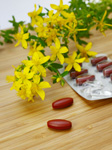 Mood disorders, including anxiety, are a significant health burden on communities. One of the most common herbs used for these disorders is St. John’s wort. The available evidence, as you’ll see here, is somewhat mixed. One study has found that St. John’s wort is reasonably effective for mild-to-moderate depression.
Mood disorders, including anxiety, are a significant health burden on communities. One of the most common herbs used for these disorders is St. John’s wort. The available evidence, as you’ll see here, is somewhat mixed. One study has found that St. John’s wort is reasonably effective for mild-to-moderate depression.
St. John’s wort comes from the flowering tops of a perennial shrub, “Hypericum perforatum.” It is widely used in Germany for the treatment of not only depression, but also anxiety and insomnia. The exact mechanism by which St. John’s wort exerts its anti-depressant and anti-anxiety effects is unknown. It is known that it can inhibit the reuptake of serotonin, norepinephrine and dopamine, which are involved with mood disorders.
Here are the studies you need to know about:
2000: Researchers used 450 mg twice a day for three months in 13 people with obsessive compulsive disorder. There was significant improvement in obsessive compulsive scores — with effects seen as early as the first week on treatment. Side effects were minor diarrhea and restless sleep.
2002: Researchers used 600 mg a day for six weeks in 151 people with somatization disorder (once upon a time known as “hysteria”). Significant reduction in anxiety was seen in the St. John’s wort-treated group. Side effects included mild to moderate stomach pain, headache, bronchitis, arthritis, irregular heartbeat, bladder infection, numbness, and tingling sensation.
2003: In 500 depressed patients with anxiety, researchers tested 500 mg of valerian and 600 mg of St. John’s wort or 1,000 mg of valerian and 600 mg of St. John’s wort a day. Both groups had significant decreases in anxiety, with the higher dose leading to better results. Side effects included insomnia, bad dreams, allergies, and overall unease.
2005: In 40 people with social phobia, researchers used 600 to 1,800 mg of St. John’s wort a day or placebo. In 12 weeks, they found no difference between the two on anxiety.
2005: In 60 people with obsessive compulsive disorder, 600-1,800 mg of the herb did not do any better than placebo. There were similar side effects in both: mild to moderate headache, insomnia, agitation, tiredness, and
stomach upset.
2009: Researchers used St John’s wort (1.8 grams three times a day) plus Kava (2.66 gram three times a day) on 28 people depressed with anxiety. Over four weeks, the combination did not show anti-anxiety effects. Mild stomach upset was the one side effect.
Except for minor mild stomach upset, rash, tiredness, and restlessness, St John’s wort is a relatively safe herb. Nevertheless, there is little evidence to support the effectiveness of St John’s wort in the treatment of anxiety disorders.
